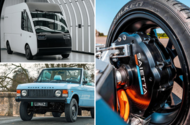“The UK is notoriously bad in supporting start-ups through to maturity,” says business economics expert
Calls for a change in how the UK backs its transport industry have followed a rough couple of months in which several EV-angled start-ups have gone under.
Recent victims of the investment crunch have included electric truck maker Volta (since bought out), electric van maker Arrival, electric motor specialist Saietta and ICE vehicle electrifier Lunaz.
Others look set to follow, including electric motorbike maker Arc Vehicle. Autocar contacted the company after establishing that it had vacated its Coventry headquers but didn’t receive a reply.
Investors have become super-cautious about EV-focused start-ups after too many got burned in the ‘gold rush’ of 2020-2021, believes Ben Hedley, CEO of electric replica maker The Little Car Company (TLCC).
“Raising institutional growth capital for an EV company is almost impossible now, and a lot of essentially sound businesses are going to go to the wall,” Hedley told Autocar.
TLCC’s unique position selling fully licensed shrunken versions of iconic classics such as the Bugatti Type 35 and Ferrari 250 Testarossa to the ultra-rich has so far allowed it to avoid the crunch, and it’s nearing the end of its Series B investment raise.
However, the days of leveraging the excitement around Tesla’s valuation are gone, said Hedley. “Venture capitalists got too excited trying not to miss out on the next big thing. For me, the point when the industry jumped the shark was when Arrival started advertising their stock ticker on the screens in Piccadilly Circus. It became about gambling on share prices, not the business fundamentals.”
The collapse in investor confidence is clear to see in the figures. Global venture capitalist fundraising fell 55% between 2021 and 2023, when it dropped to its lowest level since 2015, according to figures from financial data firm Pitchbook.
In the UK, private investment hit a record high in 2022 but dropped by two thirds last year, according to another such firm, Beauhurst.
“The last 12 months have been undoubtedly tough times globally for start-up and scale-up companies raising capital,” said Josh Denne, head of small and medium enterprise programmes for the Advanced Propulsion Centre, which administers award money from the government-backed Automotive Transformation Fund.
“The UK is notoriously bad in supporting start-ups through to maturity,” said David Bailey, professor of business economics at the Birmingham Business School.
Brexit ended business support from the European Investment Bank, since replaced by the much less generous UK Infrastructure Bank. “It’s operating on a fraction of the scale,” said Bailey.
While some of the businesses in administration are obviously still viable (Siaetta likely being one of them), others bit off more than they could chew.
“Some made strategic mistakes,” said Bailey, citing Arrival’s microfactory production concept as an example. “Getting scale matters, in my view, so I never really understood how they could produce that low cost at very small scale.”
Money has completely dried up, however. Denne cites a list of UK companies that were successful at raising investment last year, including £500 million for charging provider Gridserve, £53 million for mineral extraction firm Cornish Lithium, £23 million for electric motor maker Advanced Electric Machines and £20 million for charger maker Indra.
“Investment in clean-mobility-related companies has been resilient,” Denne said.
A long-term view is essential for investors as the electrification shift moves into a period of increased pessimism, even as the zero-carbon goal remains the same.
“I think the realisation is this is a slower, longer process than some had initially claimed,” said Bailey.
Agility is essential. A good example is British autonomous vehicle success story Aurrigo, which rapidly expanded into self-guided baggage movers for airports after being approached by the owner of British Airways in 2018.
“We had a sort of eureka moment,” CEO David Keene told the SMMT Connected conference earlier in March. “That really opened the door to a non-road application of autonomous vehicles.”
The key in the current climate is to deploy cash where you can see a return, said Keene. “We’re not raising money to develop far-out technology or vehicles; everything we do is very laser-focused on whether there’s a defined commercial pull.”
However, the difficulty in raising money means that even profitable companies could go bust if they can’t grow. Preventing that from happening is a weakness of the UK compared with other countries.
“We’ve got little pots of money from the likes of the Automotive Transformation Fund, but it’s not enough,” said Bailey. “There’s a need for an industrial strategy to back this kind of thing on a much bigger scale.”







